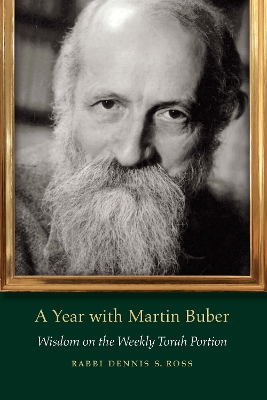JPS Daily Inspiration
1 total work
2022 Top Ten Book from Academy of Parish Clergy
The teachings of the great twentieth-century Jewish thinker Martin Buber empower us to enter a spiritual dimension that often passes unnoticed in the daily routine. In A Year with Martin Buber, the first Torah commentary to focus on his life's work, we experience the fifty-four weekly Torah portions and eleven Jewish holidays through Buber's eyes.
While best known for the spiritual concept of the I-Thou relationship between people, Buber graced us with other fundamentals, including Over Against, Afterglow, Will and Grace, Reification, Inclusion, and Imagine the Real. And his life itself-including his defiance of the Nazis, his call for Jewish-Arab reconciliation, and his protest of Adolf Eichmann's execution-modeled these teachings in action.
Rabbi Dennis S. Ross demonstrates Buber's roots in Jewish thought and breaks new ground by explaining the broader scope of Buber's life and work in a clear, conversational voice. He quotes from the weekly Torah portion; draws lessons from Jewish commentators; and sets Buber's related words in context with Buber's remarkable life story, Hasidic tales, and writing. A wide variety of anecdotal illustrations from Buber as well as the author's life encourages each of us to "hallow the everyday" and seek out spirituality "hiding in plain sight."
The teachings of the great twentieth-century Jewish thinker Martin Buber empower us to enter a spiritual dimension that often passes unnoticed in the daily routine. In A Year with Martin Buber, the first Torah commentary to focus on his life's work, we experience the fifty-four weekly Torah portions and eleven Jewish holidays through Buber's eyes.
While best known for the spiritual concept of the I-Thou relationship between people, Buber graced us with other fundamentals, including Over Against, Afterglow, Will and Grace, Reification, Inclusion, and Imagine the Real. And his life itself-including his defiance of the Nazis, his call for Jewish-Arab reconciliation, and his protest of Adolf Eichmann's execution-modeled these teachings in action.
Rabbi Dennis S. Ross demonstrates Buber's roots in Jewish thought and breaks new ground by explaining the broader scope of Buber's life and work in a clear, conversational voice. He quotes from the weekly Torah portion; draws lessons from Jewish commentators; and sets Buber's related words in context with Buber's remarkable life story, Hasidic tales, and writing. A wide variety of anecdotal illustrations from Buber as well as the author's life encourages each of us to "hallow the everyday" and seek out spirituality "hiding in plain sight."
